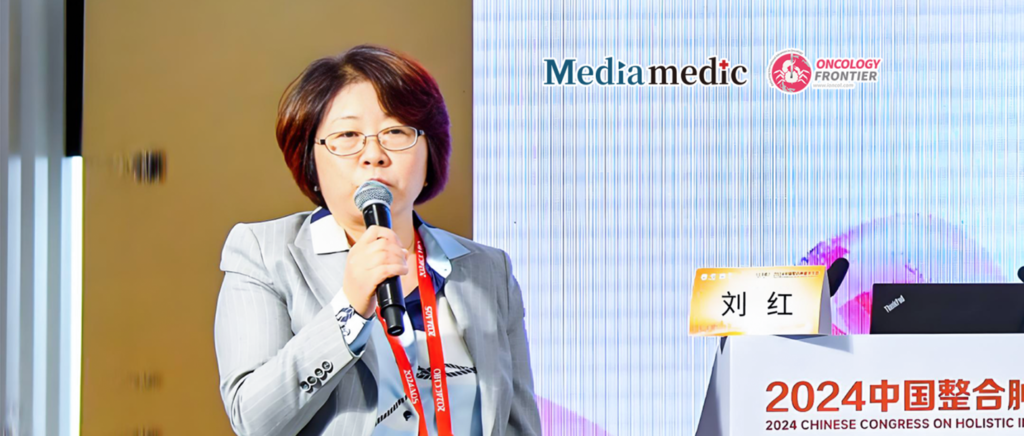
Editor’s Note:Breast cancer not only threatens patients' lives but also imposes a heavy psychological burden on women. As the number of breast cancer cases continues to rise, its rehabilitation is gaining increasing attention from society. How to effectively promote comprehensive recovery for breast cancer patients has become an important issue in the medical field. During the 2024 Chinese Congress on Holistic Integrative Oncology (CCHIO), Oncology Frontier interviewed Dr. Hong Liu, Chair of the Breast Cancer Integrated Rehabilitation Committee of the Chinese Anti-Cancer Association and a leading expert at Tianjin Medical University Cancer Institute and Hospital. Professor Liu discussed the importance of psychological rehabilitation for breast cancer patients, prospects for the development of the rehabilitation field, applications of new technologies and methods, and the significance of multidisciplinary collaboration. Drawing on her extensive clinical experience, Professor Liu shed light on new trends in breast cancer rehabilitation, offering hope for patients.Oncology Frontier: As Chair of the Breast Cancer Integrated Rehabilitation Committee of the Chinese Anti-Cancer Association, could you share your thoughts on the importance of psychological rehabilitation for breast cancer patients?
Dr. Hong Liu:Breast cancer, as one of the most common malignancies affecting women, has a particular significance. It primarily affects women and directly impacts the breast, an organ of great concern to them. It is easy to imagine the psychological pressure a woman faces when diagnosed with breast cancer, which includes the threat to her physical and mental health and the potential loss of her breast.
Psychological rehabilitation is an extremely important topic for breast cancer patients. Numerous studies have confirmed that breast cancer patients endure greater psychological stress than those with other malignancies. These psychological problems directly influence their recovery process and, in turn, their long-term treatment outcomes. As a result, addressing psychological issues has become increasingly prominent in breast cancer treatment and rehabilitation.
Oncology Frontier: Given the relatively young median age of breast cancer diagnosis in China, how should we address the specific needs of young breast cancer patients in treatment and rehabilitation?
Dr. Hong Liu:Young breast cancer patients are indeed a unique and growing group within our field. The incidence in this group has been increasing, and their cases often exhibit more aggressive biological behavior, posing significant challenges for treatment and prognosis.
At the same time, their younger age presents more complex issues during treatment. For example, many are diagnosed before marriage or childbirth, leading to concerns about their future, including marriage, fertility, and family life. These considerations compound their worries beyond their immediate health.
We must pay close attention to this group’s unique needs, particularly the challenges they face during rehabilitation.
Oncology Frontier: Could you share your suggestions or experiences regarding the long-term follow-up and management of breast cancer patients?
Dr. Hong Liu:Throughout my 30-plus years of diagnosing and treating breast diseases, I have come to deeply understand that managing breast cancer patients is a full-process and life-long endeavor. Historically, our focus has been predominantly on early diagnosis and treatment. However, as therapeutic outcomes for breast cancer continue to improve and patient survival periods extend, we must shift our attention to their quality of life.
Guided by this principle, we have increasingly emphasized full-cycle rehabilitation after treatment. In clinical practice, given the busy schedules of medical professionals, we often rely on the collective strength of our healthcare teams. For example, our hospital has established a volunteer rehabilitation service team for breast cancer patients, providing robust support for their comprehensive management. Of course, this is just one aspect of our work. We look forward to more professionals and technological platforms joining this effort to ensure that breast cancer patients genuinely benefit throughout their treatment journey.
Oncology Frontier: What do you think is the future trend in breast cancer rehabilitation? Are there any new technologies or approaches that hold promise?
Dr. Hong Liu:Breast cancer rehabilitation encompasses both physical and psychological recovery, making it a vast and complex topic.
In terms of physical recovery, we hope to see continuous advancements in surgical techniques and the development of new drugs and technologies. These innovations could enable more patients to avoid extensive breast surgeries and, in some cases, even bypass surgery altogether. This is both our vision and a future goal.
For psychological recovery, the complexity of mental health challenges necessitates close collaboration across multiple disciplines and teams to provide the most effective psychological counseling and care. Through these ongoing efforts, we aim to help breast cancer patients emerge from the shadows and embrace a brighter future.
Dr. Hong Liu
- Institution: Tianjin Medical University Cancer Institute and Hospital
- Titles: Doctor, Professor, Doctoral Supervisor
- Positions: Member of the 13th and 14th Tianjin CPPCC Standing Committee Member of the 15th Tianjin CPPCC Member of the Jiusan Society Tianjin Municipal Committee Administrative Director of the Second Department of Breast Tumors
- Current Roles: Executive Director and Deputy Head of the Academic Department, Chinese Anti-Cancer Association Scientific Advisory Board Member, International Society for Cancer Progress (2022-2025) Chairperson, Chinese Anti-Cancer Association Breast Tumor Integrated Rehabilitation Committee Chairperson-Elect, Chinese Anti-Cancer Association Cancer Prevention and Treatment Popularization Committee Standing Member, Chinese Anti-Cancer Association Integrated Cardio-Oncology Committee Chairperson, Women’s Health Branch, Chinese Geriatrics and Healthcare Medicine Research Association Standing Member, Chinese Medical Association Breast Surgery Committee Standing Member, Beijing Breast Disease Prevention and Treatment Society
- Clinical Expertise:
- Prof. Liu specializes in individualized and comprehensive breast cancer treatment, particularly minimally invasive surgeries centered on breast-conserving techniques for early-stage breast cancer. She also focuses on sequential therapies, including neoadjuvant chemotherapy, surgery, and radiotherapy for advanced cases.
- Research Contributions:
- Prof. Liu has undertaken multiple national and provincial-level projects, with two ongoing national-level and one municipal-level research projects. She has received awards for her work, including the Tianjin Science and Technology Achievement Third Prize and the Tianjin Health Bureau Science and Technology Progress Third Prize.
- Education & Training:
- Prof. Liu studied under renowned oncologists Prof. Li Shuling and Academician Hao Xishan, earning her master’s and doctoral degrees in oncology. She pursued advanced studies at Kurume University in Japan (1999) and MD Anderson Cancer Center in the United States (2007).
In recent years, she has been devoted to the precise diagnosis, treatment, and long-term management of young breast cancer patients, focusing on clinical and translational research.

